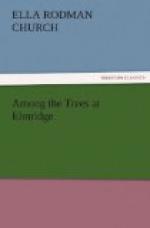Edith declared that this was one of the very sweetest stories Miss Harson had ever told them, and Clara and Malcolm were equally well pleased with it.
“Were those cherries like ours?” asked Clara.
“They were larger and finer than ours generally are, I think,” was the reply, “being the great northern cherry, or bird-cherry, of Europe, which grows in Germany to great perfection. And the little German girl’s plate of cherries, which she so generously urged upon a stranger when food of any kind was so scarce, is a beautiful illustration of the first verse of the eleventh chapter of Proverbs: ’Cast thy bread upon the waters; for thou shalt find it after many days.’”
CHAPTER XII.
THE MULBERRY FAMILY.
“There is a fruit tree,” said Miss Harson, “belonging to an entirely different family, which we have not considered yet; and, although it is not a common tree with us, one specimen of it is to be found in Mrs. Bush’s garden, where you have all enjoyed the fruit very much. What is it?”
“Mulberry,” said Clara, promptly, while Malcolm was wondering what it could be.
“Oh yes,” said Edith, very innocently; “I like to go and see Mrs. Bush when there are mulberries.”
Mrs. Bush was not a cheerful person to visit, as she was quite old and rather hard of hearing, and she lived alone in the gloomy old house with the Lombardy poplars in front, where everything looked dark and shut up. A queer woman in a sunbonnet, nearly as old as Mrs. Bush, lived close by, and “kept an eye on her,” as she said.
Mrs. Bush’s great enjoyment was to have visitors of all ages, to whom she talked a great deal, and cried as she talked, about a daughter who had died a few years ago. The little Kyles did not care to go there except when, as Edith said, there were ripe mulberries; but Mrs. Bush liked very much to have them, and Miss Harson took her little charges there occasionally, because, as she explained to them, it gave pleasure to a lonely old woman, and such visits were just as much charity, though of a different kind, as giving food and clothes to those who need them. The children delighted in the mulberries just because they did not have them at home, although they had fruit that was very much nicer; but Miss Harson never wished even to taste them, although she too had liked them when a little girl.
“The mulberry tree,” continued their governess, “belongs to the bread-fruit family, but the other members of this remarkable family, except the Osage orange, are found only in foreign countries. The bread-fruit tree itself, the fig, the Indian fig, or banyan tree, and the deadly upas tree, are all relations of the mulberry.”
“Well, trees are queer things,” exclaimed Malcolm, “to belong to families that are not a bit alike.”




